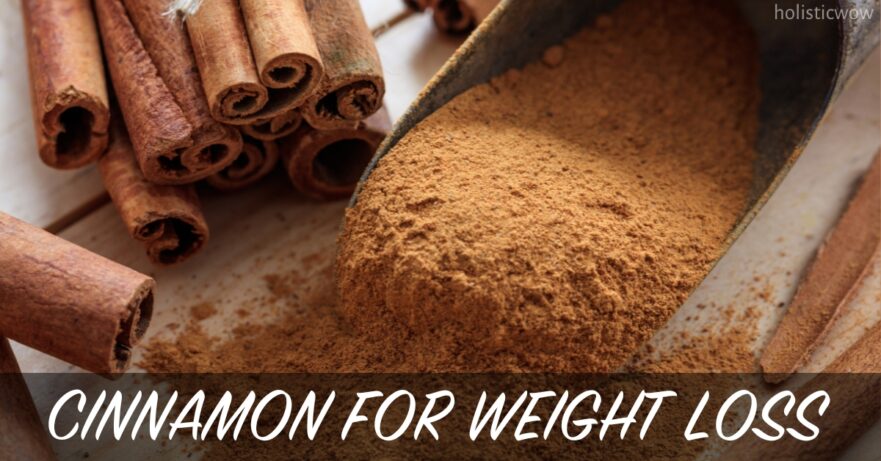What Is Cinnamon’s Role in Weight Loss?
Cinnamon may play a role in weight loss by potentially helping to reduce body weight and body mass index (BMI).
Research suggests that cinnamon supplementation, particularly at doses of 3 grams or more per day, may significantly reduce body weight and BMI, especially in individuals with higher baseline BMI.
Cinnamon is believed to influence metabolic pathways related to fat metabolism, potentially promoting fat breakdown and inhibiting fat accumulation.
While these findings are promising, it is important to note that the results from current studies may not be fully applicable to all individuals, and more research is needed to confirm these effects in broader human populations.
Therefore, incorporating cinnamon as part of a broader weight management strategy could potentially be beneficial, especially for those managing obesity, but should be done with consideration of individual health needs.
Cinnamon shows promise as a supportive supplement for weight reduction when used in conjunction with a healthy diet and lifestyle.
Key Takeaways
- 💪 Cinnamon for Weight Loss: Cinnamon may help reduce body weight and body mass index (BMI), especially when consumed in doses of 2-3 grams per day, by influencing metabolic pathways related to fat metabolism.
- 🔥 Fat Metabolism Boost: Cinnamon can support fat breakdown and inhibit fat accumulation, making it a promising addition to obesity management strategies when paired with a healthy lifestyle.
- 🍽 Appetite Control: By regulating blood sugar levels, cinnamon could help manage appetite and reduce food cravings, potentially supporting weight loss efforts.
- 🌿 Safe Usage Tips: Cassia cinnamon may offer stronger effects on blood glucose control but has higher coumarin levels, which can pose health risks; Ceylon cinnamon is a safer option for long-term use.
How Does Cinnamon Affect Fat Metabolism?
Cinnamon may influence fat metabolism by activating pathways that promote fat breakdown and thermogenesis.
Research suggests that it promotes fat breakdown and may inhibit fat accumulation by influencing specific proteins and pathways involved in fat metabolism.
By doing so, cinnamon could potentially assist in managing body weight and reducing fat accumulation, making it a promising complementary tool for obesity management .
Studies have shown that cinnamon supplementation may lead to reductions in body weight, body mass index, waist circumference, and fat mass, especially at doses of 2–3 grams per day over 12 weeks or longer.

How Does Cinnamon Influence Appetite and Food Cravings?
Cinnamon may influence appetite and food cravings by helping to regulate blood sugar levels, which can contribute to more stable energy levels and potentially reduce cravings.
By supporting more stable blood glucose and improving insulin sensitivity, cinnamon could potentially reduce cravings and lower the likelihood of overeating.
These effects on appetite regulation and food cravings can support weight loss efforts by helping manage hunger and reducing the urge to consume additional calories.
Research suggests that cinnamon supplementation may also have a positive impact on body weight, body mass index, and fat mass, particularly when taken in doses of 2–3 grams per day over several weeks.
Can Cinnamon Help Reduce Body Weight and BMI?
Cinnamon supplementation may significantly help reduce body weight and body mass index (BMI).
A systematic review and meta-analysis of randomized controlled trials found that daily doses of 2–3 grams or more were associated with noticeable results.
This suggests that incorporating cinnamon into one’s diet could potentially aid in weight management and support weight loss efforts.
However, while these findings are promising, further high-quality research is needed to confirm the long-term effects in diverse human populations.
Is Cinnamon Effective in Reducing Waist Circumference?
Cinnamon supplementation may help slightly reduce waist circumference.
Studies suggest an average reduction of about 1–2.4 cm, although in some meta-analyses, this was not always statistically significant.
This may indicate a modest decrease in abdominal fat, although further studies are needed to confirm the specific changes in fat distribution.
This is important because excess abdominal fat is linked to various health risks.
Incorporating cinnamon into a healthy lifestyle may support obesity management by contributing to reductions in waist circumference and potentially overall fat mass.
What Are the Benefits of Cinnamon for Obesity Management?
Cinnamon offers several potential health benefits for obesity management, including its ability to help reduce body weight, lower BMI, and support fat metabolism.
Research suggests that cinnamon supplementation may also help regulate hormones involved in fat storage and breakdown, potentially leading to reduced fat accumulation and enhanced fat breakdown.
These effects make cinnamon a promising addition to weight loss strategies.
Cinnamon also promotes overall metabolic health, which can further support efforts to manage obesity.
Studies indicate that cinnamon may be effective as a weight-reducing supplement when taken in doses of 2–3 grams per day for 12 weeks or longer, with some evidence suggesting greater benefits in individuals with a higher baseline body mass index (BMI).

What Types of Cinnamon Are Best for Weight Loss?
There are two main types of cinnamon: Ceylon cinnamon and Cassia cinnamon.
Cassia is the most common type found in grocery stores, while Ceylon, often referred to as “true” cinnamon, is less common.
Some studies suggest that Cassia cinnamon may be more effective in helping control blood glucose levels, which could potentially support weight loss efforts.
Research also indicates that cinnamon supplementation, in general, may help reduce body weight, body mass index (BMI), and waist circumference, particularly at doses of 2–3 grams per day or higher.
Both types of cinnamon come from different species of trees and have varying levels of coumarin, a natural compound.
Cassia contains higher levels of coumarin than Ceylon, which may pose health risks if consumed in large amounts over time.
When using cinnamon for weight loss, it’s important to consider personal health factors.
Cassia cinnamon may offer stronger short-term effects on blood glucose control, but it carries a higher risk due to its coumarin content.
For long-term use, Ceylon cinnamon is a safer option owing to its lower coumarin levels.

How Can Cinnamon Be Incorporated into a Weight Loss Diet?
Cinnamon can be easily integrated into a weight loss diet by adding it to a variety of foods and drinks:
- Sprinkle cinnamon on oatmeal or yogurt for a flavorful twist.
- Mix it into cinnamon smoothies.
- Add cinnamon to coffee or tea for an aromatic boost.
You can also incorporate cinnamon into savory dishes from Indian, Mexican, or Middle Eastern cuisines to enhance flavor while supporting your weight management goals.
Enjoy healthy snacks like cinnamon-roasted almonds, or try creative meal options such as pork loin chops with cinnamon apples.
Baking with cinnamon is another delicious way to enjoy its potential health benefits.
Research suggests that cinnamon supplementation may help reduce body weight, body mass index (BMI), and fat mass, especially when consumed regularly at doses of 2–3 grams per day.
While cinnamon can be a helpful addition to a weight loss diet, it is best used in conjunction with a balanced diet and a healthy lifestyle, rather than relying on it alone or using high-dose supplements without medical guidance.
What Does Clinical Research Say About Cinnamon and Weight Loss?
Clinical research suggests that cinnamon supplementation may contribute to modest reductions in body weight and body mass index (BMI).
Systematic reviews and meta-analyses of randomized controlled trials suggest that daily doses of 2–3 grams over 12 weeks or more could yield noticeable results.
While these findings are promising, further high-quality research is needed to confirm these effects and elucidate the underlying mechanisms.
Are There Any Risks or Side Effects of Using Cinnamon for Weight Loss?
Cinnamon contains coumarin, a compound that can cause liver damage if consumed in extremely high doses.
Ceylon cinnamon has much lower levels of coumarin compared to Cassia cinnamon, making it potentially safer for regular use.
While it’s unlikely to consume harmful amounts through normal dietary use, individuals using cinnamon supplements or large amounts of Cassia cinnamon should exercise caution and consult a healthcare professional before making significant dietary changes involving cinnamon.
This ensures safety and addresses any individual health concerns related to its consumption.
Herbal Preparations and Recipes for Weight Loss
Herbal remedies can support weight loss efforts by influencing fat metabolism, regulating appetite, and stabilizing blood sugar levels. Cinnamon, in particular, has shown potential benefits in these areas. The following recipes incorporate cinnamon and other herbs to aid in weight management.
Always consult a healthcare provider before starting any new herbal regimen, especially if you have existing health conditions or are taking medications.
Cinnamon Weight Loss Tea
Ingredients:
- 1 teaspoon ground cinnamon
- 1 cup of boiling water
Preparation:
- Place the ground cinnamon in a cup.
- Pour boiling water over the cinnamon.
- Cover and steep for 10 minutes.
- Strain if desired and drink 1-2 cups daily.
This simple tea harnesses the potential of cinnamon to help regulate blood sugar and support appetite management, making it a valuable addition to a weight loss strategy.
Warnings: Avoid high doses of Cassia cinnamon, as it contains coumarin, which may cause liver damage with long-term or excessive use. Individuals with liver conditions, bleeding disorders, or known allergies to cinnamon should avoid this preparation. Cinnamon may also interact with antidiabetic or anticoagulant medications—consult your healthcare provider before use.
Cinnamon and Herbal Weight Management Blend
Ingredients:
- ½ teaspoon ground cinnamon
- ½ teaspoon dried dandelion leaf
- ½ teaspoon dried ginger root
- ½ teaspoon dried peppermint leaf
- 1 cup of boiling water
Preparation:
- Combine all the herbs in a teapot.
- Add boiling water and steep for 15 minutes.
- Strain and drink 1 cup 1-2 times daily.
This blend combines cinnamon with dandelion, ginger, and peppermint. Dandelion supports digestion and may help reduce water retention. Ginger may stimulate thermogenesis and help regulate metabolism , while peppermint can help soothe digestion and support appetite control . Together, these herbs may enhance the weight loss effects of cinnamon.
Warnings: Cinnamon: See above. Ginger may increase the risk of bleeding; avoid taking high doses during pregnancy or if taking blood thinners. Peppermint may relax the lower esophageal sphincter and exacerbate symptoms of acid reflux; caution is advised for individuals prone to heartburn. Dandelion may act as a diuretic and could interact with blood pressure medications or diuretics. Individuals allergic to ragweed or related plants should use dandelion with caution. Avoid during pregnancy unless medically advised.
These herbal preparations can complement a balanced diet and exercise program aimed at weight management. However, they should not replace conventional medical treatments. Always consult a healthcare provider before starting any new herbal regimen, particularly if you have existing health conditions or are taking medications.

